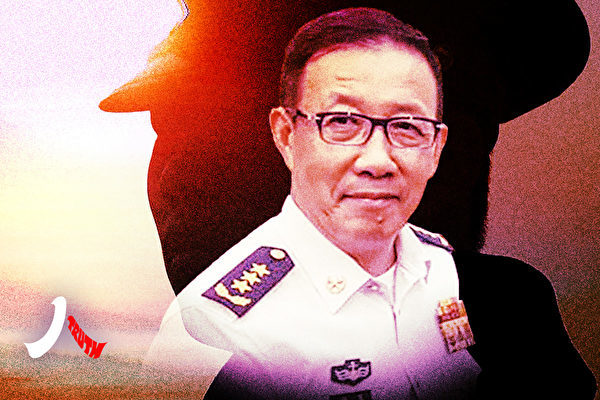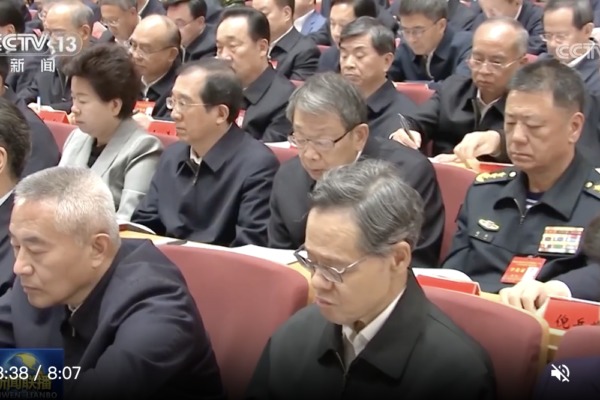As of October this year, at least 22 CCP officials in Guangdong Province have been dismissed, among whom 19 are under investigation, 2 have been sentenced, and 1 has been expelled from public office. Illustration. (Video screenshot)
People News - On November 28, the Ministry of National Defense spokesperson officially announced that Central Military Commission member and Director of the Political Work Department, General Miao Hua, is under investigation for serious violations of discipline and has been suspended from his duties.
This news has caused a massive shockwave. Overseas social media and the X platform (formerly Twitter) generally interpret Miao Hua's investigation as a sign of Xi Jinping's diminishing power within the military. Former PLA Navy headquarters lieutenant colonel and staff officer Yao Cheng stated on social media that the Central Military Commission (CMC) is effectively paralyzed. He argued that Miao Hua's downfall indicates Xi Jinping has lost control over the PLA. Yao speculated that Xi might resign as General Secretary and Chairman of the CMC at the Fourth Plenary Session, retaining only the position of State President.
On November 29, both Yao Cheng and overseas commentator Cai Shenkun posted on the X platform that the new commander of the PLA Rocket Force, Wang Houbin, had also been taken for investigation. Yao also revealed that Defense Minister Dong Jun had been interviewed by a joint investigative team from the Central Commission for Discipline Inspection (CCDI) and the military's discipline inspection commission. However, Dong has not been detained and remains in the Navy compound.
On November 30, Cai Shenkun discussed the investigation of Miao Hua in detail during his YouTube commentary program. However, he noted that the idea of Xi Jinping losing all military power and stepping down next year is unlikely.
It is widely known that Miao Hua has been one of Xi Jinping's key proxies within the military. Together with He Weidong, both of whom hail from the CCP's 31st Group Army faction, they formed a "iron triangle" alliance with Xi in the CMC. Members of the 31st Army are now scattered across the CMC headquarters, major theater commands, and various service branches. This group wields significant influence, largely due to Miao Hua's appointments and arrangements. Removing Miao Hua would deal a severe blow to Xi's power within the military.
Rumors of Miao Hua's troubles have been circulating online for two to three months, and now the proverbial shoe has dropped. However, this event carries many peculiarities, reflecting the turbulent and enigmatic nature of the CCP's current political situation and the intense internal power struggles. The final outcome remains uncertain.
The announcement of Miao Hua's investigation came from the Ministry of National Defense rather than the CCDI or the military's discipline commission. It was proactively disclosed during a regular press briefing by Defense Ministry spokesperson Wu Qian on November 28. This is unprecedented, as the Ministry of National Defense is an administrative body under the State Council, operating under the dual leadership of the State Council and the CMC. For the Defense Ministry to announce the investigation of a CMC member appears to be a first in CCP history.
Wu Qian's announcement consisted of only 40-50 words: "Central Military Commission member and Director of the Political Work Department, General Miao Hua, is suspected of serious violations of discipline. Following the decision of the Central Committee, Miao has been suspended for investigation."
According to Cai Shenkun's X platform post, Miao Hua was taken for investigation on November 9. If this information is accurate, the CCP proactively announced the case in less than 20 days.
Miao Hua’s predecessor as a Central Military Commission (CMC) member and Director of the Political Work Department, General Zhang Yang, hanged himself at home on November 23, 2017. Interestingly, it was not until November 28 of that year that the CCP's official media, Xinhua News Agency, and the PLA Daily announced that Zhang Yang had been under investigation for serious violations of discipline and law since August 28, and had committed suicide out of guilt on November 23. Rumors of Zhang Yang’s arrest had been circulating online for two to three months before the announcement, but the CCP suppressed the information until after his death.
According to official CCP reports, Zhang Yang had been under investigation by the CCDI (Central Commission for Discipline Inspection) officials while staying at home. He was not arrested nor suspended from his duties before his death and was merely under investigation.
This raises questions: According to CCP's official narrative, Zhang Yang was under investigation for serious violations but was not arrested or suspended, and his case wasn’t announced until after his suicide. Meanwhile, Miao Hua, only accused of serious disciplinary violations, has been suspended and, according to rumors, was taken from his home with a black hood over his head, with his case officially announced in just over 20 days. Why the discrepancy?
Overseas media widely believe that Zhang Yang was purged by Xi Jinping due to a coup plot involving Fang Fenghui. At the time, Xi relied on Wang Qishan’s high-intensity anti-corruption campaign to sweep away Jiang Zemin’s military faction, which had little capacity to fight back. Thus, the handling of Zhang Yang’s case, including the rumors, the official announcement, and its resolution, followed a relatively consistent and logical pattern.
However, the details surrounding Miao Hua’s case are much more perplexing. For instance, why was the announcement made by the Ministry of National Defense? Is Miao Hua currently at home or in a soft detention facility under the CCDI? Why was he suspended for a mere disciplinary violation? Why was the case announced so quickly?
Does this suggest that the case of Miao Hua reflects an intense and undisclosed power struggle between Xi Jinping and Zhang Youxia?
A key phrase in Wu Qian’s official statement further complicates matters: "After deliberation by the Central Committee, it was decided to suspend Miao Hua for investigation."
By contrast, in Zhang Yang’s case, the phrasing was: "With the approval of the Central Committee, the Central Military Commission decided to conduct organizational talks with Zhang Yang, a former member of the CMC and former Director of the Political Work Department."
In 2017, around the 19th Party Congress, Xi Jinping’s power was on the rise. After removing Guo Boxiong and Xu Caihou from the military, he sought to cleanse their influence. The handling of Zhang Yang’s case could be managed smoothly by the CMC and the military discipline inspection commission under Wang Qishan’s supervision. Xi’s political opponents, primarily Jiang Zemin’s faction, were at a disadvantage, making Zhang Yang’s case relatively straightforward.
The situation with Miao Hua, however, is far more complex. First, Miao Hua is one of Xi Jinping’s key allies, not someone Xi intended to purge. Xi’s anti-corruption campaign has always been selective, prioritizing political struggles over actual corruption. He has no reason to target Miao Hua. Second, it is likely that Miao Hua is a target of Zhang Youxia, who may have teamed up with the military discipline inspection commission chairman, Zhang Shengmin, to remove Miao as part of a close-range attack on Xi. Third, Xi Jinping would not surrender without resistance. Xi reportedly involved Li Xi’s CCDI to intervene, as Yao Cheng revealed, with Miao being investigated by a joint task force from both the CCDI and the military commission’s discipline commission. This is likely why the announcement phrased it as "after deliberation by the Central Committee."
An alternative explanation is that Xi Jinping opposed investigating Miao Hua, but Zhang Youxia, allied with political elders and princelings, pushed the decision under the banner of "collective leadership by the Central Committee."
The phrasing "decided by the Central Committee" is enigmatic, suggesting that the Miao Hua case conceals an intense, hidden power struggle, with Xi Jinping fighting back like a cornered beast.
Another noteworthy incident coincides with the announcement of Miao Hua’s case. On November 28, The Financial Times reported that Defense Minister Dong Jun was under investigation. This revelation might have deliberately or unintentionally shifted the CCP’s internal power struggle. During the same November 28 press briefing, Wu Qian firmly denied the investigation of Dong Jun, even referring to him respectfully as "Minister Dong Jun" in response to journalists’ questions.
What signal does this send? Dong Jun was reportedly recommended by Miao Hua to Xi Jinping as Defense Minister and is also a member of Peng Liyuan’s Shandong faction. According to Yao Cheng, Dong Jun was questioned after returning from Laos on November 21 but was not detained. Yao speculated that Dong Jun may have become a whistleblower, providing evidence unfavorable to Miao Hua. Is Xi Jinping abandoning Miao Hua to protect Dong Jun?
Another detail that has been largely overlooked: According to Xinhua, on the evening of November 21 local time in Brazil (the morning of November 22 Beijing time), Xi Jinping, returning from the G20 summit in South America, made a sudden "technical stop" in Morocco. This unplanned landing was not part of Xi’s itinerary.
This timing is highly significant, coinciding with Dong Jun being questioned. Could it be that Xi, upon learning of the investigation, became suspicious and uncertain about Zhang Youxia’s next moves? Did Xi fear a potential coup upon his return to Beijing, prompting the unexpected landing to assess the situation back home? There were similar rumors in August 2023, when Xi, after attending the BRICS summit in South Africa, did not return directly to Beijing but stopped in Urumqi, Xinjiang, where Public Security Minister Wang Xiaohong later joined him. Xi’s numerous enemies may have left him in constant fear of a coup in Beijing.
The investigation into Miao Hua and the apparent safety of Dong Jun may reflect a compromise strategy by Xi Jinping—if he cannot protect Miao, he might aim to protect Dong Jun as a middle-ground approach. According to a report by the Central News Agency, after Wu Qian announced at 3 PM on November 28 that Miao Hua had been suspended for investigation, a few foreign media outlets managed to bypass the press conference's internet signal blockade and were the first to break the news. However, Chinese media did not begin reporting the announcement until around 8 PM, and even then, they only repeated the official phrasing: "Miao Hua is suspected of serious disciplinary violations. After deliberation by the Central Committee, it was decided to suspend Miao Hua for investigation."
On November 29, PLA Daily relegated the news about Miao Hua to its fourth page, while People’s Daily placed it on the 11th page. Both newspapers buried the story within broader reports on the multiple announcements Wu Qian made during the press briefing, with minimal coverage that was easy to overlook.
This approach was clearly an effort by Cai Qi to downplay the negative impact of Miao Hua’s investigation and the Dong Jun incident on Xi Jinping and the CCP, presenting an illusion of stability while masking the precarious situation Xi faces as his opponents in the military take aim at him.
Nevertheless, Xi Jinping's era of strongman politics appears to have reached its end. If Xi were to fall from power, the collapse of the CCP would not be far behind.
(First published by People News)










News magazine bootstrap themes!
I like this themes, fast loading and look profesional
Thank you Carlos!
You're welcome!
Please support me with give positive rating!
Yes Sure!